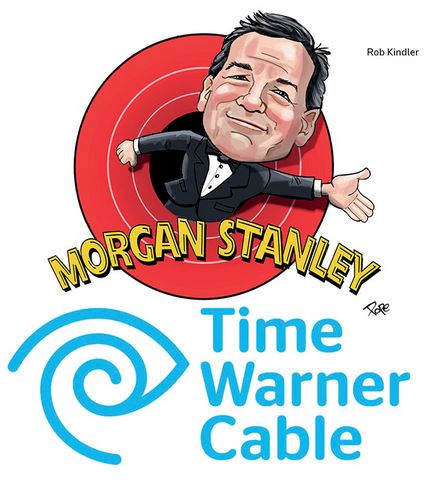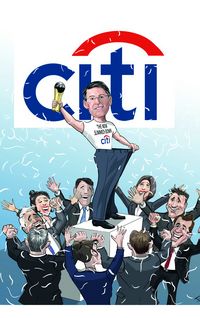Timely advice
Defending a major client from an unwanted approach is the ultimate mandate for a corporate finance adviser; finding an alternative solution under such pressure is the hallmark of great advice. For achieving such outcomes for Time Warner Cable and others, Morgan Stanley is IFR’s M&A Adviser of the Year.
After a record 2015, the past year has been quieter for M&A, with the value of completed deals in the first three quarters at US$2.3trn, according to Thomson Reuters data, 7% below the total for the same period last year.
But Morgan Stanley defied market trends. In the first nine months of 2016 the firm advised on 204 completed deals totalling US$690bn – 49% higher than in the same period of 2015 – pushing Morgan Stanley to number two in the league table for completed deals.
Although the firm still lagged Goldman Sachs, the gap had been closed. Goldman’s total deal value, at US$885bn from 200 deals, was 2% lower than in the previous year. And its revenues from M&A work fell 14%. Morgan Stanley’s went the other way, rising an impressive 10%.
Four deals that completed this year were significantly larger than any others: Anheuser-Busch InBev’s US$110bn acquisition of SABMiller; Royal Dutch Shell’s US$81bn takeover of BG Group; Time Warner Cable’s US$78bn tie-up with Charter Communications and Dell’s US$66bn purchase of EMC.
Morgan Stanley had a prized sellside role on all of them. The first two were uncontested, partly because of their size – with few rivals able to lodge competing offers and upset further sector consolidation. Nevertheless both deals looked vulnerable at critical stages.
AB InBev was forced to revise its bid at the last moment after the run on sterling following the UK’s vote to leave the European Union meant the cash component of the initial agreed offer was less attractive to SABMiller’s shareholders.
Morgan Stanley played a key role in closing the deal, with its equity markets team able to ensure sufficient shareholders were available to vote on the deal, even after hedge fund Elliott Capital had built a potential blocking stake largely through non-voting contacts for difference.
“There are lots of boutiques out there, but you need to be able to say how a stock will trade post-deal and what the market reaction will be,” said Rob Kindler, Morgan Stanley’s global head of M&A. “That is the key element that equity trading gives you beyond advice on structuring, regulatory clearance and other matters.”
Shell was also persuaded to stick to its offer for BG, despite the collapse in oil prices during the course of the deal putting at risk the economic rationale for the transaction.
Charter deal
Morgan Stanley’s sellside prowess really came to the fore in the other two major transactions.
Time Warner Cable’s sale to Charter took time to come to fruition. The latter had first approached Time Warner several years ago. Morgan Stanley instead flushed out an alternative bidder, Comcast, whose offer failed after the regulators blocked it last year.
Shortly after that ruling, Charter returned to make a second approach but at a much higher price, which shareholders gladly accepted.
Robert Marcus, former CEO of Time Warner Cable, was impressed with Morgan Stanley throughout. “They did a great job on our merger with Charter,” he said. “They were very involved in our first run with Comcast. I thought they provided great advice and really delivered.”
The transaction was complicated by the fact that Time Warner Cable had various strategic investors, such as Liberty, who wanted to receive Charter shares. At the same time Charter was completing the purchase of smaller rival Bright House Networks in a stock transaction.
This meant Time Warner Cable used four different banks during the transaction to help manage all these moving parts. But Marcus is clear that the advice from the Morgan Stanley team, led by Kindler, was vital.
“Rob is as brilliant a strategist and tactician in complicated deals as anyone out there, so you want him on your side,” said Marcus.
Drawing on Kindler’s long-term support to Time Warner as a whole was vital after Charter’s first unsolicited approach to the media giant’s spun-out cable division.
“Working with Morgan Stanley we came up with a strategy to set a price with specific terms. If Charter was willing to meet the terms, we would consider a deal,” said Marcus. “That turned out to be a very effective strategy not only to fend off Charter, but to elicit a competing offer from Comcast.
“We didn’t get that deal done but it changed the game in terms of the pricing.”
The strategy meant the talks with Charter could then proceed on a far more appealing basis for Time Warner Cable shareholders, in a situation that now had competitive tension with other potential partners circling too.
Morgan Stanley deftly negotiated a transaction for the company, which set up the next step. In October, the parent company confirmed it had agreed to a US$108bn offer from AT&T, the largest announced deal of the year.
Morgan Stanley’s work for Time Warner epitomised its success as a defence strategist.
Staying independent
Sometimes a company’s priority is to remain independent rather than find an improved take-out offer. Morgan Stanley successfully managed to do this for railway operator Norfolk Southern, which fended off a US$37bn approach from Canadian Pacific Railway.
“Our defence practice is a deep one. Some reckon a decent defence from an approach lasts only 110 days. Keeping a company independent can be the right defence strategy for shareholder value,” said Kindler.
Dell’s acquisition of EMC was also the end of a long-running saga in the personal computer space, which had started with Dell’s sale to its private equity backer Silver Lake for US$24bn in 2013. The duo then realised the group needed to reposition as computing embraced cloud technology.
Morgan Stanley again showed the benefits of being active in the equity capital markets, since through its intervention shareholders of EMC, the firm’s client, received tracking shares in VMWare, a Dell-linked entity, in addition to cash through a complex structured offer.
The firm is also advising agrochemical company Monsanto on its US$64bn approach from German chemicals company Bayer, the second largest announced deal of the year.
Changing dynamics
Morgan Stanley’s practice outside the US is well positioned to take advantage of the changing dynamics of investment, which is seeing buyers in China, Japan and other parts of Asia becoming increasingly active outside their domestic markets.
“We are in a robust position in China and Japan,” said Colm Donlon, head of M&A, EMEA. “Europe is attracting lots of interest from Asia; we are well positioned to advise on such approaches.
“This cycle is different. Asian acquirers are going into Europe and not the US. European acquirers are going into the US, and US acquirers are predominantly looking at domestic deals rather than outside.”
A stand-out cross-border deal was Swiss insurer ACE’s US$29bn purchase of US group Chubb, the biggest-ever deal in the insurance sector. Here, Morgan Stanley displayed its buyside credentials, advising ACE solo on how to make sure its offer was preferable to the many other tentative approaches from other bidders in this hotly contested auction.
Navigating the period after the apparent peak of an M&A cycle is never easy. 2016 did not see a dramatic drop-off in transactions from the peak, but being in the right position for sellside clients to get deals done before any possible decline in value is tricky.
Morgan Stanley has managed to gain market share by giving excellent advice to more clients than usual.
To see the digital version of this review, please click here.
To purchase printed copies or a PDF of this review, please email gloria.balbastro@tr.com



